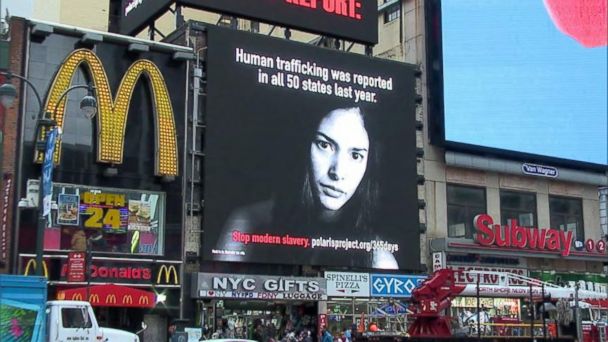Super Bowl Is Largest Weekend in US Prostitution, Advocates Say
One of the biggest sporting events of the year also means one of the biggest events for sex trafficking of the year.
"Any type of major sporting event or major convention, homecomings, any major event where there is going to be a lot of men, a lot of money, a lot of alcohol, there is going to be an increase in demand for commercial sex, which leads to more sex trafficking," Andrea Powell, founder and executive director for FAIR Girls, a nonprofit that prevents the exploitation of girls worldwide, told ABC News.
The $32 billion a year illicit industry, second only to drug trafficking, victimizes between 300,000 to 400,000 American children every year in some form of sex-trafficking, according to the Blue Campaign, the U.S. Department of Homeland Security program aimed at educating the public about the crime.
The average age for entering into child prostitution is only 13 years old, according to the Department of Justice.
Related: Sex trafficking survivor reflects on Cleveland case, offers advice.
Pimps will transport women and children to New York against their will, advocates said, not for the biggest weekend in football, but for the largest weekend in prostitution in the United States.
The number of prostitution ads in New York websites jumped by 50 percent over the weekend and is expected to triple by Sunday, advocates told ABC News.
"They're not even old enough to go to a prom, not even old enough to get a driver's license and yet we still are seeing more and more of it on the Internet," said Sen. Amy Klobuchar, D-Minn., who recently introduced a bipartisan bill with Sen. John Cornyn of Texas focusing on providing a "safe harbor" for children of sex trafficking.
"During the Dallas Super Bowl in 2011 there was a 300% increase in the Internet ads regarding sex trafficking on some of these sites. In the Florida Super Bowl in 2009 they were actually advertising a young woman as a Super Bowl special," Klobuchar said.
Klobuchar said she met with NFL officials last week, who pledged their support for strong sex trafficking laws.
There are new billboards this week in Times Square, at Madison Square Garden, and videos playing in major train and bus stations to raise awareness of the issue.

(ABC News)
With the Super Bowl less than a week away, the new campaign's purpose is to help the public - and those working in transportation, look out for and recognize the signs of sex trafficking.
"These are places we know that victims end up. They will see billboards, they will know someone is out there to help them," Keeli Sorensen with the POLARIS Project, an organization that works on all forms of human trafficking and serves victims of slavery and human trafficking, told ABC News.
Flight attendants and airport workers are among those trained to recognize sex trafficking among the thousands heading to the Super Bowl.
Delta Air Lines, the official airline sponsor of Super Bowl contender the Seattle Seahawks, will fly the Seahawks to the big game. And company officials told the House Foreign Affairs Committee at a hearing this week that the company trained nearly all of its 8,000 employees who work and live in the New York area to be "the eyes and ears to spot potential cases of human trafficking and point them out to the police for action."
Polly Hanson, Chief of Police for AMTRAK, said the railroad will soon start airing 30-second human trafficking videos on all television screens in its stations.
And the training has been working.
In Boston, a child prostitution ring was smashed and 86 children were freed after an airline worker noticed a man traveling with two crying children.
Nancy Rivard, a flight attendant for American Airlines and founder of Airline Ambassadors, said thanks to training they have "caught a dozen trafficking cases that I know off."
Flight attendants often see "girls that are coming in to get nanny jobs or think they are coming in for a modeling situation" that isn't real, Rivard said. "If we can catch that situation before it becomes a reality, that girl's life is saved."
All because the airline worker had been trained to look for tell-tale signs, such as someone who doesn't have control of their own ID, appears under the control of another, or looks lost, advocates said.
"The everyday public can look for signs of [gang] branding, girls that look like they don't belong," Powell with FAIR Girls added. "It's better to be a little nosy and be wrong than to let a victim walk out of your life and then she never gets the help that she needs."